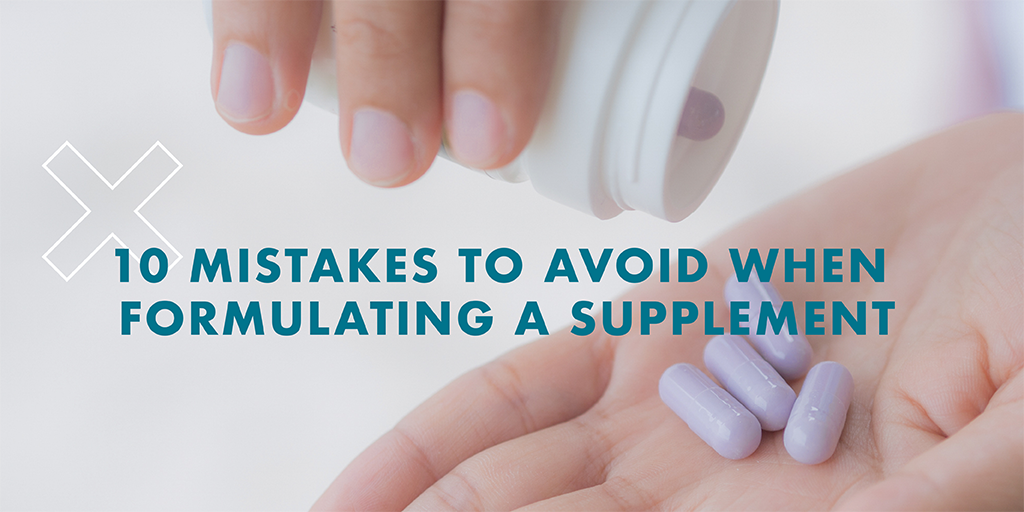
10 Mistakes to Avoid When Formulating a Supplement
1.) Starting Product Development without Market Research
2.) Formulating without Goals or Intention
3.) Not staying up-to-date with FDA Regulations
The FDA regulates which raw materials are banned. The last thing you want to do is complete the formulation process just to find out later down the line that a raw material used in your formula is banned. Review these regulations before finalizing a formula to ensure your supplement is in the clear. The FDA also keeps an “Advisory List” for materials that haven’t been banned but don’t appear to be lawful and should be avoided. You can find both lists here.
4.) Determining Certifications after Formulating
5.) Ignoring Potencies and Label Claims
Potencies and Label Claims can get complicated. However, it’s vital to understand that most ingredients are not 100% pure. With potency testing, the concentration of active ingredients can be measured for accurate content claims.
For example, magnesium citrate is only 14% active magnesium. To hit label claim of 100mg magnesium, ~715 mg of magnesium citrate would need to be put into the formula.
6.) Not reviewing FDA Daily Value Regulations
The FDA regulates the daily values for vitamins and minerals. When you formulate a supplement designed to account for a percentage of a person’s daily value of a nutrient, it will have to coincide with what the FDA determines a person’s daily value of that nutrient is. When the FDA makes adjustments to these values, your formula will need to adjust too.
7.) Selecting Flavors that don’t compliment Formula Actives
Flavoring your supplement is one of the most exciting steps in formulating. However, problems can occur when your flavor choices don’t compliment the natural flavors that already exist in your formula’s actives. Use the natural flavors from ingredients to your advantage and choose additional flavors that will compliment them.
What to avoid (Example): Formulating a Vitamin C supplement, which has a natural citrus flavor, and choosing to flavor for a coconut taste.
8.) Forgetting to add necessary Excipients
Although excipients will not provide any beneficial value, including them in a formula can provide other values to a supplement. This includes contributing to the consumer’s experience by enhancing aesthetic, taste or form. By utilizing excipients in an effective and conscious way, you can increase the quality and performance of the supplement.
Excipients are tremendously helpful in instances such as using magnesium stearate to ensure an even fill weight to meet label claim or using calcium silicate to stop a product from clumping.
9.) Lacking Patience in the Formulation Process
Although formulation is not the longest process in the grand scheme of creating a supplement, make sure to give it the quality time it deserves. The average time to formulate a supplement is two weeks, however, be accepting that it may take longer to reach your desired results.
10.) Formulating a supplement with no distinction
Last but not least, it’s important to implement distinction in your supplement’s formula. By establishing a unique selling proposition, you can better position your formula and standout in the market. There is a time and place for stock formulas, however, distinction in formulation is often what will set a supplement apart from its long list of competitors and drive its sales.
Wellness Through Innovation
It is our mission to provide a seamless customer experience through innovative collaborations, highest-quality products, and unparalleled service. Get started today with a free quote.
Wellness Through Innovation
It is our mission to provide a seamless customer experience through innovative collaborations, highest-quality products, and unparalleled service. Get started today with a free quote.
Wellness Through Innovation
It is our mission to provide a seamless customer experience through innovative collaborations, highest-quality products, and unparalleled service. Get started today with a free quote.
Let's Stay Connected
Contact
-
+1.661.775.2500
-
28903 Avenue Paine
Valencia, CA 91355 USA -
Main Headquarters Hours
Monday - Friday 8AM to 5PM -
Shipping & Receiving Warehouse Hours
Monday - Friday 8AM to 2:30PM
Disclaimer: The information provided by Lief Labs on our website is for general informational purposes only. The information on the website does not constitute legal or other professional advice. All information on Lief Labs’ website is provided in good faith, however we make no representation or warranty of any kind, express or implied, regarding the accuracy, adequacy, validity, reliability, or completeness of any information on our website and/or the links provided. Lief Labs and its parents, subsidiaries, owners, shareholders, and employees are not liable for any damages arising in contract, tort or otherwise from the use of any information on our website. Because your business has its own unique needs, you should consult with legal counsel experienced in FDA, FTC and regulatory matters.
© Copyright 2024 by Lief Organics. All Rights Reserved.

